The “I do” in Indian weddings is a multi-million-dollar extravaganza that will make your head spin faster than the bride and groom during their eleventh outfit change.
By Peden Doma Bhutia
March 18, 2024
It was an ultimate A-List event – Rihanna, Ivanka Trump, Mark Zuckerberg, Bill Gates, Disney CEO Bob Iger, Bollywood superstar Shah Rukh Khan, Bhutanese King Jigme Singye Wangchuk, and cricket legend Sachin Tendulkar.
While the guest list reads like a mini-Davos summit, they were all guests at the pre-wedding bash of Anant Ambani, youngest child of Mukesh Ambani, one of the richest men in Asia with a net worth of $114 billion.
To understand the nuptial’s scope, consider that the three day party was just the pre-game. The actual wedding isn’t until July.
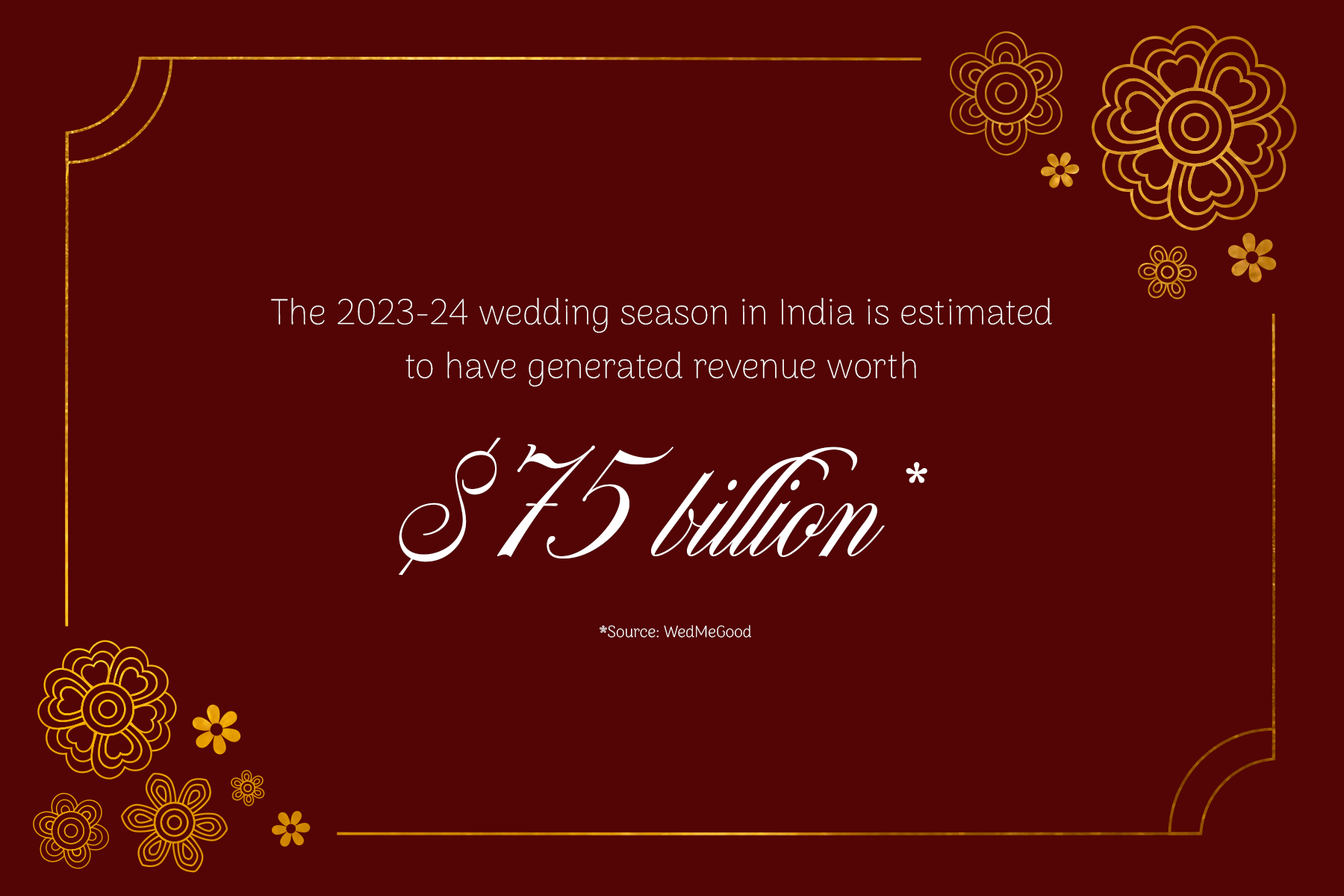
Ambani’s daughter’s wedding in 2018 was big too. Hillary Clinton and John Kerry showed off their dance moves while Beyonce performed. It reportedly cost $100 million.
Indian weddings redefine extravagance: From helicopters to haute couture, private jets for guests to feasts fit for royalty (literally!), these weddings aren’t just celebrations. They are massive economic engines, driving billions in spending.
Between November 23 and December 15, 2023, about 3.5 million couples tied the knot in India leading to spending that totaled around INR 4.25 trillion ($57 billion), according to a survey by Confederation of All India Traders.
That’s a lot of spending in just 23 days, and includes everything from venue bookings to catering to decorations. And then of course, there are elaborate pre-wedding shoots, ready to give any Bollywood production a run for its money.
Skift Research estimates that a typical Indian wedding at an international destination costs about $215,000.
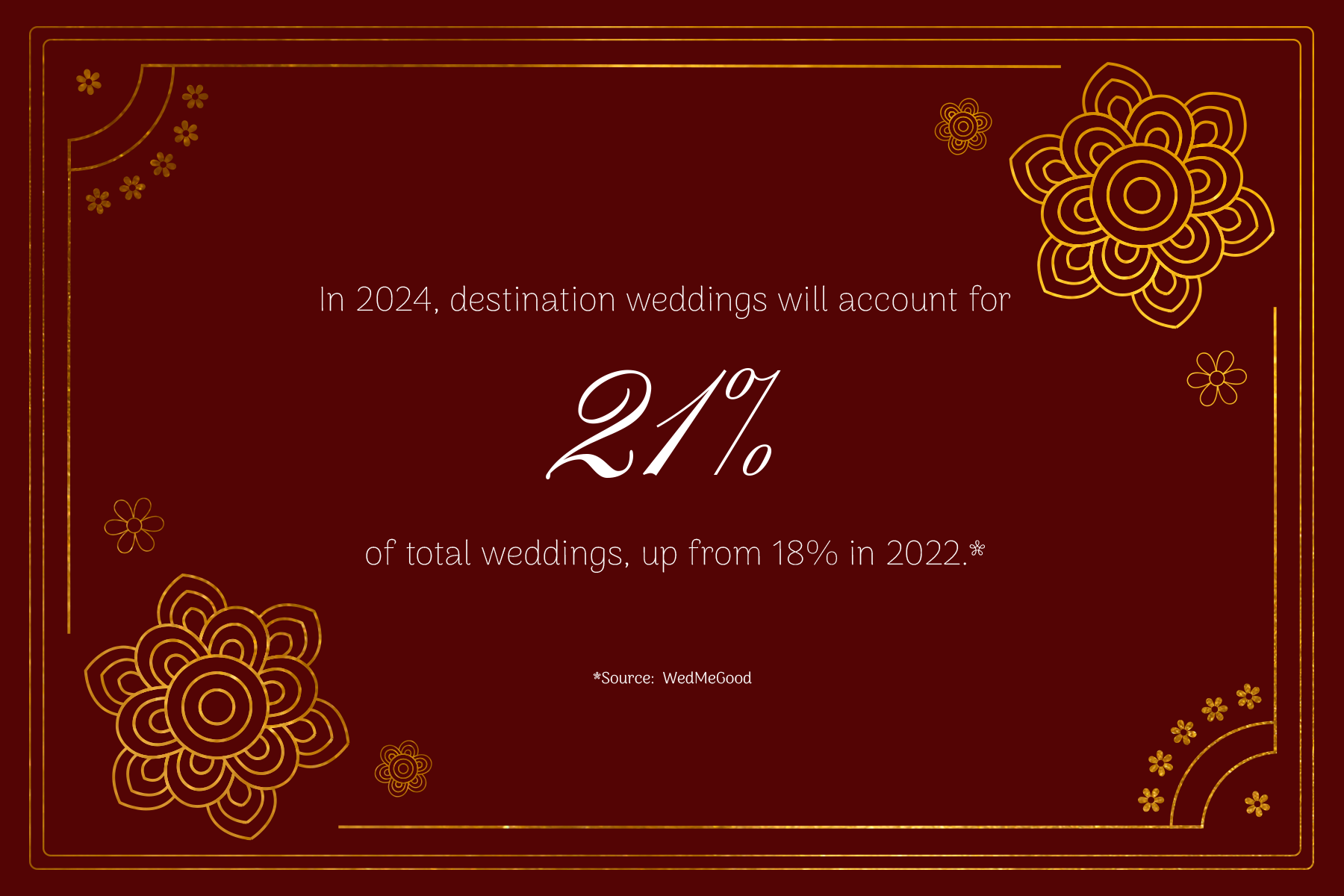
As weddings evolve into grander affairs, there’s a growing trend to host these extravaganzas at luxury hospitality venues.
“In the past, families would typically rent out large spaces for weddings, rarely considering hotels,” said Parthip Thyagarajan, CEO of WeddingSutra.com, a wedding planning portal. “But times have changed. Today, hosting a wedding at luxury hotel properties has become the norm, driven by the allure of brands like W, Ritz-Carlton, Taj and Oberoi.”
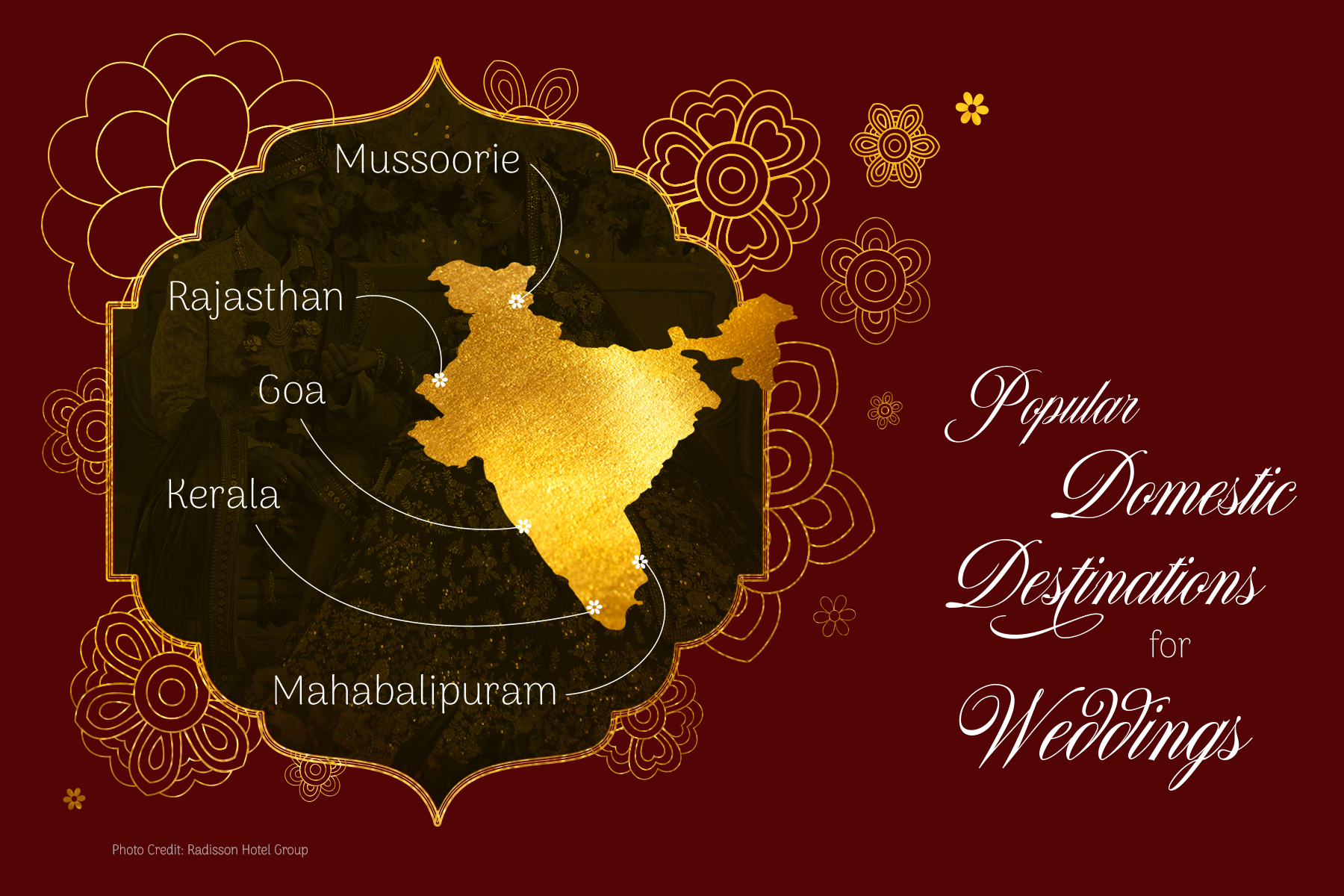
City hotels are also seeing a surge in wedding bookings.
In 2023, Marriott hosted over 900 weddings in India, contributing nearly 10% to its revenues in India. The hotel chain expects this trend to keep going strong into 2024, according to Khushnooma Kapadia, Marriott’s vice president marketing — South Asia.
In 2016, Marriott launched “Shaadi by Marriott,” a one-stop shop for personalized weddings. Last year, recognizing a growing preference for bespoke, artisanal weddings, Marriott launched “Shaadi by Marriott Bonvoy Reimagined.”
“With a vast portfolio of 148 hotels and 17 brands spanning cities, smaller markets, and resort destinations across India, Marriott is able to cater to weddings of all sizes and styles,” Kapadia said.
And why did Hilton select Jaipur as the city for the launch of Waldorf Astoria in India? “If you’re going to do uber-luxury in the India market, you need to do it in Rajasthan, so you can attract high-end weddings because that’s where the true dollar value is,” said Alan Watts, Hilton’s Asia Pacific president.
Rajasthan is a popular place for both Indian and international celebrity weddings, Elizabeth Hurley selected Jodhpur as her wedding destination in 2007. The Katy Perry-Russell Brand wedding of 2010 took place in Ranthambore.
In 2021, Hilton introduced a marketing initiative called “Wedding Diaries by Hilton.”
“This year, under Wedding Diaries by Hilton, we plan to personalize experiences with celebrity chefs and sustainable weddings aimed at reducing carbon footprints. Simultaneously, our food and beverage offerings will expand, incorporating partners committed to conscious practices,” said Manish Tolani, vice president and commercial director at Hilton India.
These celebrations have a far-reaching economic impact, especially on the tourism sector.
Picture this scenario, said Thyagarajan from WeddingSutra: A family travels to attend a destination wedding in Mahabalipuram. Once the festivities are over, they stick around to explore Chennai, maybe head to Pondicherry, or venture further into South India.
Once considered a luxury reserved for the wealthy, destination weddings are also gaining popularity.
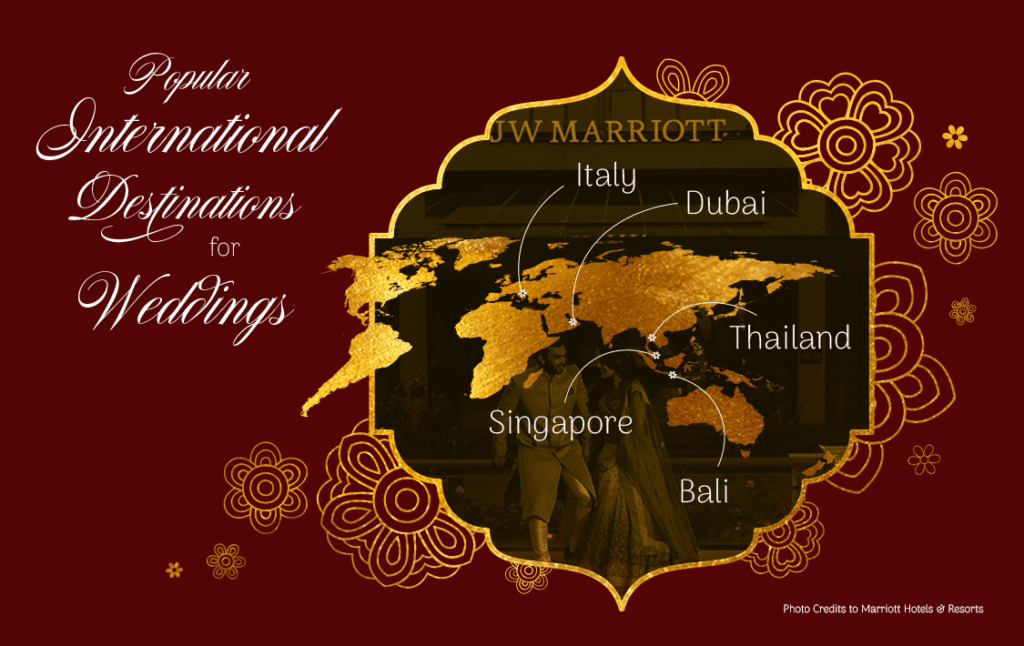
Destinations like Thailand, UAE and even European hotspots are eyeing India’s ultra high-net worth individuals. They know that Indian weddings are about more than just a few days of celebrations; they’re about extended stays, shopping sprees, and exploration, observed Thaygarajan.
Thailand is one of the top wedding destinations for Indians. “We host about 400-500 Indian weddings each year,” said Siriges-a-nong Trirattanasongpol, director of Tourism Authority of Thailand’s (TAT) New Delhi office.
The TAT director said that direct flights and proximity to India is a driver, and the country has the staff to needed to perform Indian weddings. The scheme that allows Indians to enter Thailand without a visa until May 2024 has also helped.
The tourism board regularly organizes events like wedding symposiums and trips for wedding planners to lesser-known destinations in the country.
“We also look forward to increasing our wedding centric marketing campaigns by brand integration in wedding shows, Bollywood movies and print advertising in wedding magazines,” said Trirattanasongpol.
Last year, Prime Minister Narendra Modi made an appeal to “Wed In India,” promoting domestic destinations versus overseas locations.
Celebrities like Alia Bhatt-Ranbir Kapoor, Katrina Kaif-Vicky Kaushal, Kiara Advani-Sidharth Malhotra or Parineeti Chopra-Raghav Chaddha, have all hosted their wedding in India.
There’s no denying there’s been a transformation in how families approach their children’s wedding planning, according to Samit Garg, co-founder and managing director of E Factor Experiences.
Garg shares an anecdote: There’s this middle-class couple who had a simple wedding back in the 1990s. Fast forward to their daughter’s wedding, and it’s a whole new ball game. We’re talking luxury destinations, professional event planners, days of festivities filled with top-notch entertainment and global cuisine. And let’s not forget the bride’s stunning designer outfit, a far cry from her mother’s modest attire.
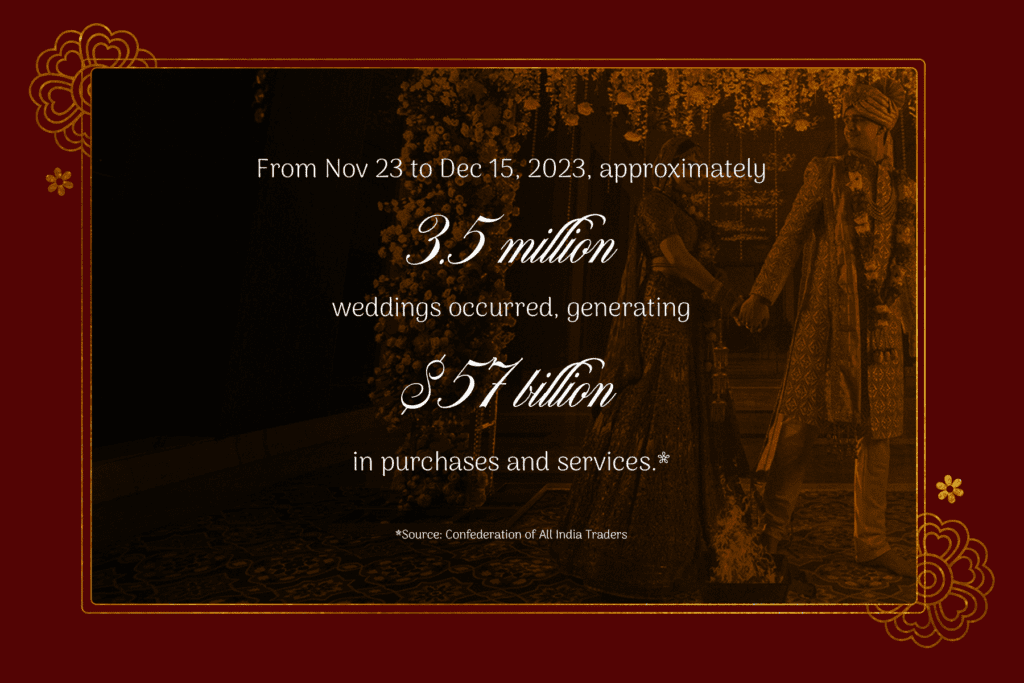
This change in attitude could be attributed to the economic policies implemented in the country post 1991, which spurred economic growth and improved living standards. Influenced by a liberalized economy, middle-class couples started opting for lavish celebrations compared to the past simplicity.
As a result, what began traditionally as communal gatherings then evolved into a thriving industry involving attire, jewelry, beauty services, gifts, cuisine, and elaborate decorations.
India is the world’s second-biggest consumer of gold. Gold imports stood at $1.9 billion in December, the peak wedding season, bringing the cumulative imports to $37.85 billion from April-January in fiscal 2024.
“Weddings, being an important market for the industry, have witnessed significant growth in recent years due to rising disposable incomes, demand for intimate and personalized experiences, and government initiatives like the ‘Wed in India’ campaign,” said K.B. Kachru, chairman emeritus and principal advisor, Radisson Hotel Group South Asia.
The financial burden of hosting these weddings can be overwhelming, especially for lower-income families, leading to debt from societal pressure and dowry expectations. Already living on tight budgets, some may resort to borrowing money from loan sharks at exorbitant interest rates.
Some non-governmental organizations also facilitate mass or community weddings, enabling multiple couples to marry at a shared venue. This approach also helps to ease the financial strain on families associated with individual weddings.
There are families that still prefer smaller celebrations. Findings from a survey by wedding planning portal WedMeGood show that around 12% of couples prefer intimate gatherings, focusing on adding personal touches to their special day.
In some communities, you’ll find families splurging on jewelry and attire while keeping the overall wedding fairly modest. Others might go all out on food while sticking to a more conservative budget for decor and entertainment, Thyagarajan observed.
And then there are couples that are opting to finance their own weddings. “I made the conscious decision early on to fund my own wedding,” explained Gaurav Gupta, an engineer. “I started saving for it, and if needed, I was prepared to explore financial schemes such as those offering the Marry Now Pay Later option. It’s about taking ownership while ensuring our parents are not overwhelmed with the financial responsibility.”
According to the IndiaLends WeddingSpends Report 2.0, of brides and grooms who plan to self-fund their weddings, 41% plan to use their savings, 26% said they would consider personal loans.
Fintech lenders also partner with hotel chains to offer Marry Now Pay Later schemes. SanKash, a travel fintech, partnered with Radisson Gurugram last year to launch the initiative.
“We aim to disburse INR 1 billion ($12 million) in the fiscal 2024,” said Akash Dahiya, co-founder and CEO of SanKash. SanKash’s credit options under the initiative range up to INR 2.5 million ($30,000), depending on customer requirements, and can be spread over 12 months with a 6-month no-cost monthly installment option.
SanKash has now partnered with multiple hotels across the country.
What comes next? Weddings today are not just about traditions; they’re a chance for couples to show off their individual, tastes and preferences. And with India’s economy — and middle class — leading global consumption, the price tags for Indian weddings are sure to keep growing too.